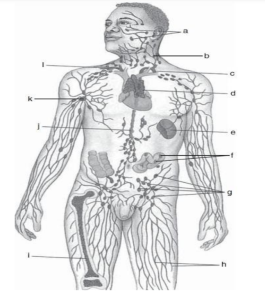






Name
Chamberlain University
BIOS-242 Fundamentals of Microbiology
Prof. Name
Date
This lab consists of two distinct parts. The first part involves labeling the anatomical structures associated with the lymphatic system. The second part requires answering a series of questions. Upon completion of the lab, please ensure that you submit your work to the designated basket.

| Anatomical Structure | Label |
|---|---|
| TONSILS | a |
| CERVICAL LYMPH NODES | b |
| THORACIC DUCT | c |
| THYMUS | d |
| SPLEEN | e |
| PEYER’S PATCHES (IN INTESTINE) | f |
| INGUINAL LYMPH NODES | g |
| LYMPHATIC VESSELS | h |
| BONE MARROW | i |
| CISTERNA CHYLI | j |
| AXILLARY LYMPH NODES | k |
| RIGHT LYMPHATIC DUCT | l |
Explain why the lymphatic system is a one-way system, whereas the blood vascular system is a two-way system.
The lymphatic system operates as a one-way system, collecting lymph from interstitial fluid and transporting it to lymph nodes for cleansing. After processing, the lymph is directed to lymphatic ducts and trunks, ultimately draining into the subclavian and jugular veins to re-enter the bloodstream. In contrast, the blood vascular system functions as a two-way system, delivering nutrients and gases to cells while removing waste products.
How do lymphatic vessels resemble veins?
Lymphatic vessels are similar to veins in that they lack a significant tunica media and are generally larger in size. Both types of vessels require external assistance to facilitate the movement of lymph and blood, respectively.
How do lymphatic capillaries differ from blood capillaries?
Blood capillaries transport blood from small arterioles to small venules, while lymphatic capillaries carry lymphatic fluid from tissues to lymphatic venules. Structurally, lymphatic capillaries have a slightly larger diameter and thinner walls compared to blood capillaries.
What is the function of the lymphatic vessels?
Lymphatic vessels transport lymph from peripheral tissues to the venous system. They play a crucial role in transporting lymphocytes, removing foreign matter and cellular debris through phagocytosis, and contributing to the body’s immune response. Additionally, they facilitate the transport of fats from the small intestine to the bloodstream.
What is lymph?
Lymph is a clear to yellowish fluid found throughout the body. It circulates through tissues, collecting fats, bacteria, and other unwanted materials, which are filtered out via the lymphatic system. Lymph is similar to plasma but contains lymphocytes and chyle.
What factors are involved in the flow of lymphatic fluid?
The flow of lymphatic fluid is influenced by the milking action of skeletal muscles and pressure changes within the thorax that occur during breathing.
What name is given to the terminal duct draining most of the body?
The terminal duct that drains most of the body is known as the Thoracic Duct.
What is the function of B cells in the immune response?
B cells differentiate into plasma cells upon activation and secrete antibodies. These antibodies are proteins that bind to specific antigens, marking them for destruction, which is a key aspect of humoral immunity.
What is the role of T cells?
T cells are responsible for directly attacking virus-infected tissue cells. Helper T cells activate B cells into plasma cells and cytotoxic T cells, while other T cells can inhibit the immune response, providing cellular immunity.
Define the following term related to the operation of the immune system: Recognition of self from non-self.
Recognition of self refers to the ability of immune cells to identify the body’s own cells as safe and refrain from attacking them. In contrast, non-self refers to foreign substances that invade the body, such as pathogens and allergens. Some non-self entities may have been encountered previously, allowing the immune system to recognize them and mount a more efficient attack using memory cells.